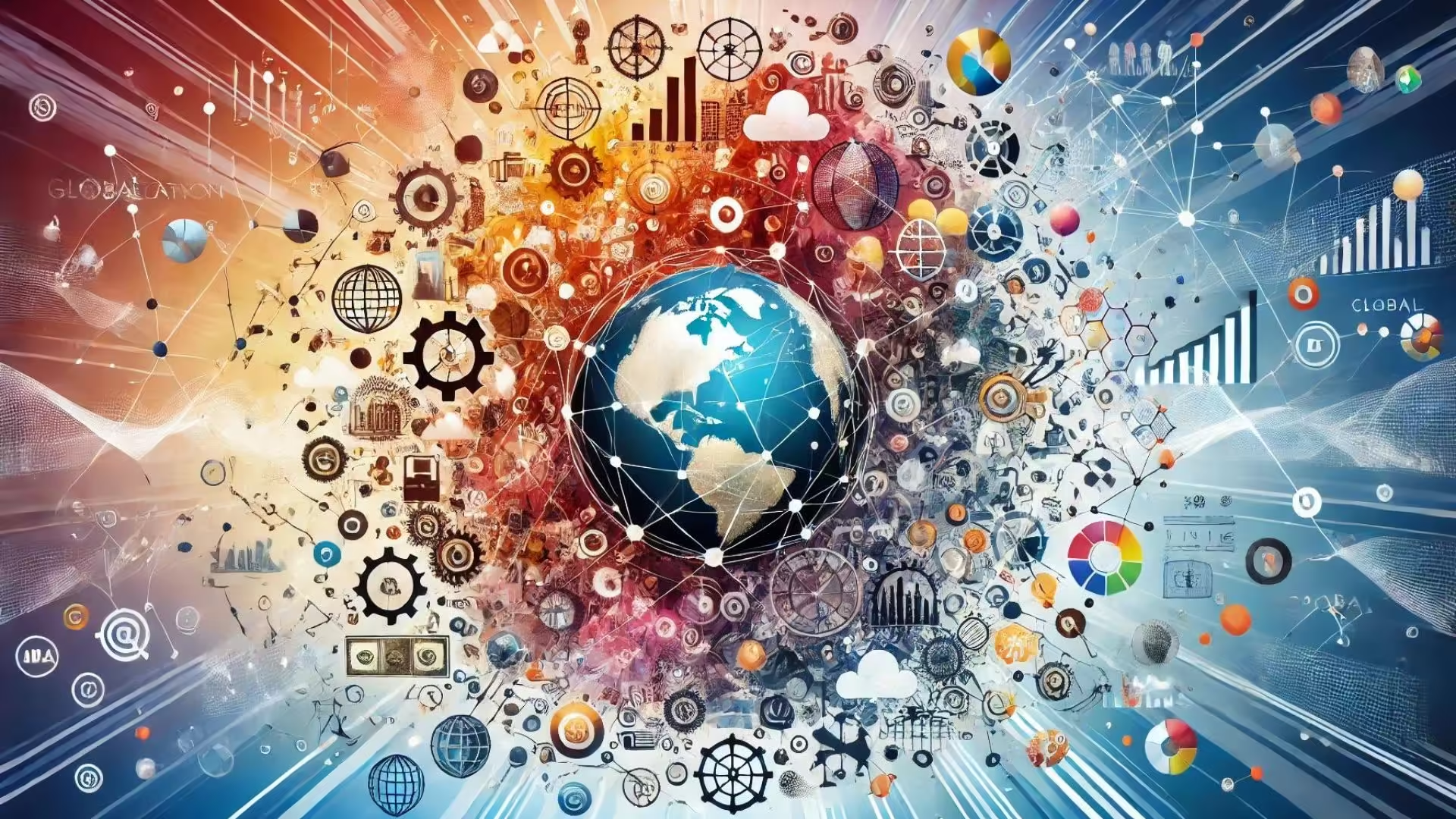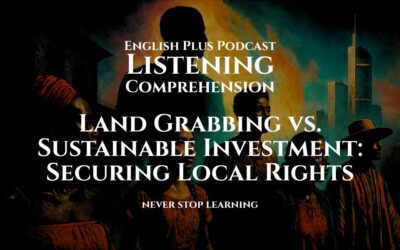Listen | Globalization and Its Effects
Listening Comprehension Quiz
Transcript: Please don’t check the transcript before you listen and take the quiz.
Ladies and gentlemen, today we’re diving into one of the most significant and complex phenomena of our time: globalization. Now, you’ve probably heard this term tossed around in the news, in your classes, or maybe even in casual conversations. But what does it really mean, and more importantly, how does it affect our world and our daily lives? Let’s break it down together.
Globalization, in its simplest form, is the process by which the world becomes more interconnected. Imagine the world as a giant web where every point is connected to another. It’s like when you post a picture on Instagram, and within seconds, someone halfway across the world can like it. That’s a small example of globalization at work. But of course, it’s not just about social media. We’re talking about the movement of goods, services, people, and ideas across borders. Think of it like this: your smartphone, the food you eat, the clothes you wear, and even the music you listen to are all likely influenced by globalization.
But, as with most things, globalization has both positive and negative effects. On the one hand, it has opened up incredible opportunities. For instance, businesses can now reach customers across the globe, creating a more dynamic and competitive market. This can lead to innovation, better products, and often lower prices for consumers. Imagine you’re craving sushi in the middle of Europe. Thanks to globalization, you can satisfy that craving because ingredients and culinary traditions have traveled across continents.
However, globalization is not without its drawbacks. One of the biggest concerns is that it can lead to economic inequality. While some countries and companies thrive, others may struggle to keep up. Picture a small local business trying to compete with a multinational corporation that has far more resources. It’s like David versus Goliath, but Goliath wins most of the time in this scenario.
Another effect of globalization is cultural homogenization. This is the idea that as cultures mix, local traditions and identities may start to fade. Think about it: when you walk into a shopping mall in Tokyo, New York, or Dubai, you’ll likely see the same brands, eat at the same restaurants, and hear the same music. While it’s great to have access to these global goods, it can sometimes feel like the world is becoming one big, uniform place. We lose a bit of that uniqueness that makes each culture special.
And then, of course, there’s the environmental impact. Globalization has increased production and consumption, leading to more waste, pollution, and depletion of natural resources. Imagine the carbon footprint of shipping a product from one side of the world to the other. It adds up, and unfortunately, our planet is feeling the strain.
So, what do we do with all of this information? Is globalization good or bad? Well, it’s not that simple. It’s a double-edged sword. What’s important is that we understand its effects and find ways to maximize the benefits while minimizing the harm. For instance, supporting fair trade products or being conscious of the environmental impact of the things we buy are small steps we can take as individuals.
In the end, globalization is here to stay, and it will continue to shape our world in profound ways. By staying informed and making thoughtful choices, we can help ensure that it leads to a more connected, equitable, and sustainable future for everyone.
Expand Your Vocabulary
- Globalization:
Meaning: The process by which different parts of the world become interconnected through trade, culture, and communication.
In Context: In the article, globalization is described as the web of connections that links people and businesses across the globe.
Everyday Use: You might hear about globalization when discussing international business, travel, or even food. For example, “Globalization has made it possible for me to enjoy sushi in my hometown.” - Interconnected:
Meaning: Linked or related to one another.
In Context: The world is described as being interconnected, meaning that events in one part of the world can affect people everywhere.
Everyday Use: “The internet has made us more interconnected than ever before; what happens in one country can impact us all.” - Cultural Homogenization:
Meaning: The process by which different cultures become more similar and lose their distinct characteristics.
In Context: The article explains how globalization can lead to cultural homogenization, where global brands and products dominate, making places feel the same.
Everyday Use: “Some people worry that cultural homogenization is causing us to lose our unique traditions and customs.” - Economic Inequality:
Meaning: The unequal distribution of wealth and resources in a society.
In Context: Globalization can widen economic inequality by making it harder for smaller businesses to compete with large corporations.
Everyday Use: “Economic inequality is a major issue in many countries, with the rich getting richer and the poor struggling to make ends meet.” - Competitive Market:
Meaning: A market where multiple businesses compete to attract customers, often leading to innovation and lower prices.
In Context: The article mentions that globalization creates a more competitive market, which can benefit consumers.
Everyday Use: “The tech industry is a highly competitive market, with companies constantly trying to outdo each other.” - Carbon Footprint:
Meaning: The amount of carbon dioxide emissions produced by an individual, organization, or product, contributing to climate change.
In Context: The environmental impact of globalization is discussed, including how shipping products globally increases our carbon footprint.
Everyday Use: “I’m trying to reduce my carbon footprint by using public transportation and eating locally produced food.” - Fair Trade:
Meaning: A trading partnership that seeks greater equity in international trade, ensuring fair wages and ethical practices for producers.
In Context: The article suggests that supporting fair trade products is one way to mitigate the negative effects of globalization.
Everyday Use: “I prefer buying fair trade coffee because I know the farmers are being paid fairly for their work.” - Multinational Corporation:
Meaning: A large company that operates in several countries.
In Context: The article contrasts small local businesses with multinational corporations that benefit from globalization.
Everyday Use: “Multinational corporations like Apple and Amazon have a huge influence on the global economy.” - Sustainability:
Meaning: Meeting the needs of the present without compromising the ability of future generations to meet their own needs.
In Context: The article discusses how globalization challenges sustainability due to increased consumption and environmental degradation.
Everyday Use: “Sustainability is important to me, so I try to minimize waste and support eco-friendly products.” - Dynamic:
Meaning: Constantly changing, energetic, and active.
In Context: The article describes the global market as dynamic due to the continuous innovation and competition brought by globalization.
Everyday Use: “The job market is dynamic; you have to keep updating your skills to stay relevant.”
Vocabulary Quiz
Let’s Talk
- Globalization and You: How has globalization personally impacted your life? Do you think these impacts are mostly positive or negative?
- Cultural Identity: Do you think cultural homogenization is a serious concern? How can we preserve cultural diversity in a globalized world?
- Economic Inequality: Do you believe globalization widens economic inequality? What can be done to ensure that smaller businesses and developing countries also benefit?
- Environmental Impact: What are some ways you can reduce your carbon footprint in the face of globalization? Do you think individuals can make a significant difference?
- Supporting Fair Trade: Do you consciously buy fair trade products? Why or why not? How do you think supporting fair trade can influence the global market?
- Global vs. Local: In your opinion, should we prioritize supporting local businesses over multinational corporations? What are the advantages and disadvantages of each?
- Sustainable Globalization: Can globalization be sustainable? What changes do you think need to happen to make global trade more environmentally friendly?
- Globalization’s Future: How do you see globalization evolving in the next 10 or 20 years? What challenges and opportunities do you anticipate?
- Adaptation: How do you think you can adapt to the rapidly changing global market? What skills do you think are essential to thrive in this dynamic environment?
- Personal Responsibility: How can we, as individuals, make more thoughtful choices in a globalized world? Do you think small actions can collectively make a big difference?
Feel free to share your thoughts in the comments, or discuss these questions with your friends and family. It’s through conversations like these that we deepen our understanding of the complex world we live in!










0 Comments